- Home
- Media Kit
- MediaJet
- Current Issue
- Past Issues
- Ad Specs-Submission
- Reprints (PDF)
- Photo Specifications (PDF)
- Contact Us
- PRIVACY POLICY
- TERMS OF USE
![]()
ONLINE
![]()
ONLINE

Winning Championships
Editors’ Note
Jerry Reinsdorf began his career as a tax attorney with the Internal Revenue Service after earning credentials as both a CPA and a lawyer. He became Owner and Chairman of the Chicago Bulls in 1985, guiding the team to six NBA Championships in the 1990s and helping shape the franchise into a global powerhouse. Recognized as one of the most influential figures in professional basketball, Reinsdorf was elected to the Naismith Memorial Basketball Hall of Fame in April 2016. As Owner of the Chicago White Sox since 1981, Reinsdorf also played a pivotal role in bringing a World Series title to Chicago in 2005, while overseeing charitable, community-focused efforts that twice have earned MLB’s prestigious Allan H. Selig Award for Philanthropic Excellence.”
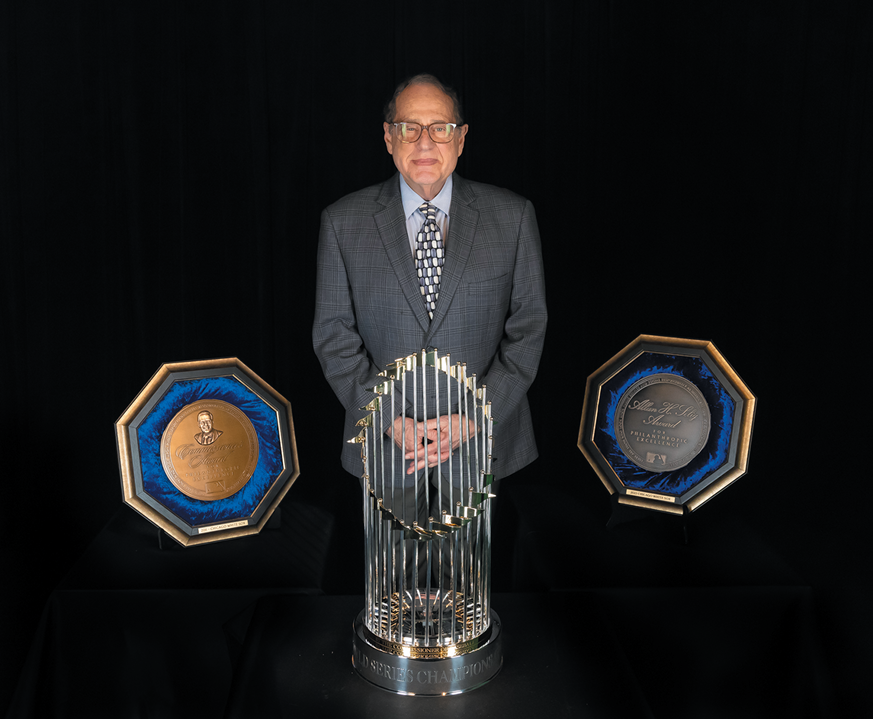
Will you discuss your career journey?
As a young boy sleeping on a cot in the hallway of my family’s Brooklyn apartment, I could never have imagined competing for NBA championships and World Series titles for a living. I could hardly imagine even owning a car.
After graduating from George Washington, law school brought me to Chicago. Looking back at my career, I would never say I operated with a long-term plan in place. I was pragmatic in whatever came next, working for the IRS, founding Balcor, eventually selling to American Express, putting together the investment groups to purchase the Chicago White Sox and then the Chicago Bulls, building the United Center. Each step was based on where I saw the greatest personal challenge and most opportunity. Eventually, my professional success led to some amazing opportunities in the sports world. If I were not chairman of the White Sox and Bulls, it’s likely no one would know my name. And believe me, I would be very comfortable with that.
Even now, at age 89, I still get a thrill walking through the doors of the ballpark or basketball arena each day for “work.” My job truly does keep me young and engaged. In the sports world, you never know on any given day what might come across your desk. For example, on one random day this May, I received the surprising news the newly elected Pope, Leo XIV, is a White Sox fan. How can you prepare for that? Many days, I just shake my head in wonder at the place I’m fortunate to be in today. Who could imagine a President and a Pope being White Sox fans?
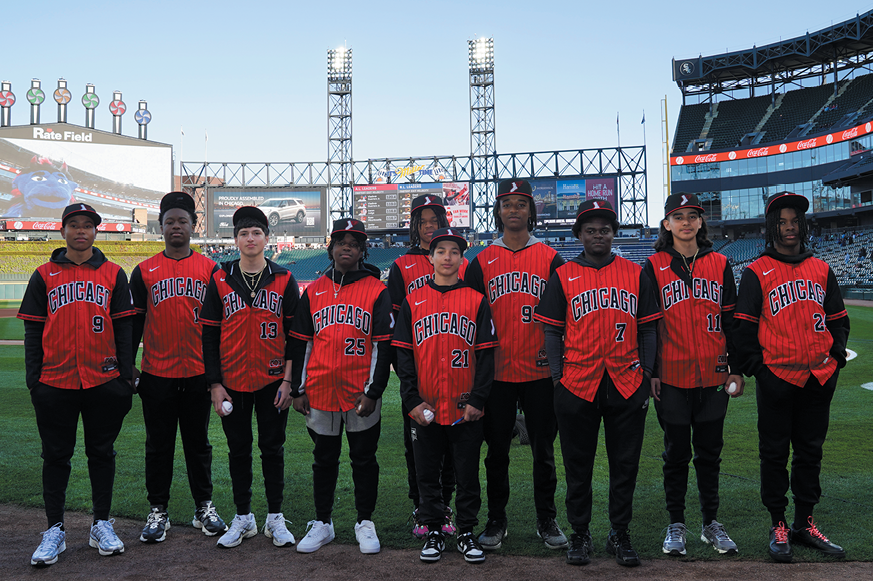
Participants in the White Sox’s nationally recognized
ACE (Amateur City Elite) youth baseball program
When you reflect on your decades in sports ownership, what do you consider your proudest accomplishment?
The obvious tangible answer is the seven championships in sports, six NBA titles with the Bulls and the World Series championship with the White Sox in 2005. However, when people ask me this question in casual conversation, my answer almost always goes to my pride that both sports franchises do such a tremendous job at positively impacting lives in our community. These are impacts that can change peoples’ lives forever. I am so proud of our ability to do that so well.
Whether we are talking about on-field performance or off-the-field efforts, the answer is the same: the awesome ability for sports teams to make millions of people happy, to bring joy and make a positive difference.
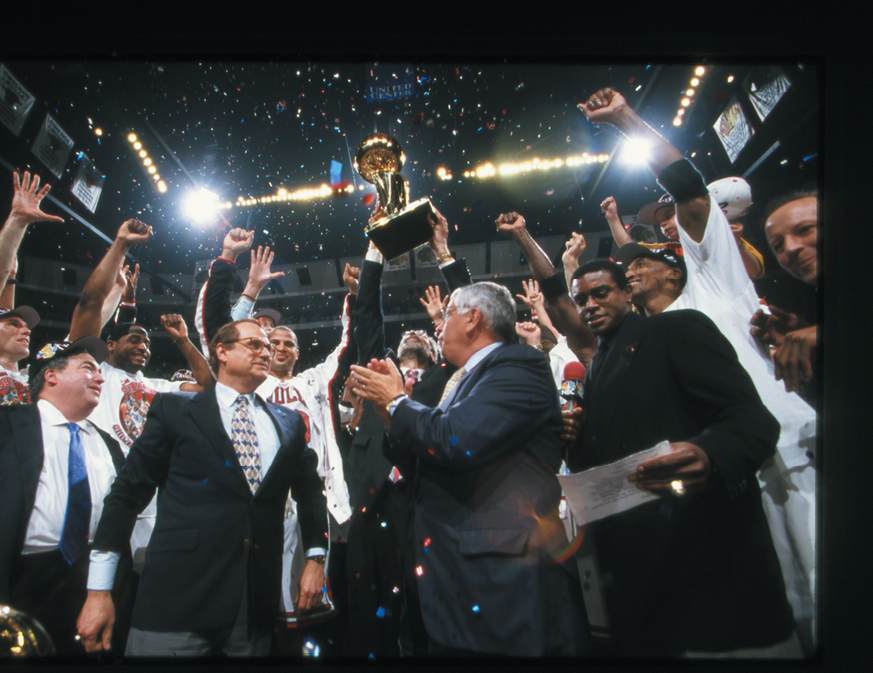
NBA Commissioner David Stern presenting the
Championship trophy to Jerry Reinsdorf in 1997
What are the keys to building a winning culture across a professional
sports organization?
I believe the role of the executive in any company is to set the organization’s vision, hire the best people, and then trust them to make the right decisions. Once that framework is up and operating, culture and results naturally follow. Probably the other key moment for an executive comes when the organization faces a crisis, something that potentially threatens your operations. At that moment, decisions and direction need to be determined by your foundational principles and those are often established and reinforced, in times of crisis, by the executive. Integrity matters. Who are we and what do we stand for as an organization? When you get those answers right, like great coaches do, success – and winning – naturally follow.
You commit your time and resources to a number of philanthropic causes. What has made philanthropy so important to you?
Cities, communities, and fan bases give so much to their sports teams. In the snow and rain, loyal fans will brave the elements to give their heart and support to their teams. It only makes sense that we return the support with the incredible platform we hold. The philanthropic arm of the White Sox – Chicago White Sox Charities – began with the simple purpose to help support the effort to fight against pediatric cancer, and has grown into a vibrant organization, uniting our fans, clubhouse and front office to help make Chicago a better place to live, work and play. Today, White Sox Charities contributes more than $2 million annually to support efforts impacting children and families in crisis, youth health and wellness, youth education, as well as our founding pillar of pediatric cancer and treatment. This summer, thanks to the amazing support of our fans, sponsors and others, we have topped $50 million in cumulative giving.
.png)
Jerry Reinsdorf in the Bulls locker room with Michael Jordon
Through its philanthropic arm, Chicago Bulls Charities (CBC), the Bulls support impactful programming in dozens of neighborhoods across the city – touching the lives of thousands of children and families each year. CBC is committed to leveraging the power of the Bulls’ platform to uplift and support organizations that are addressing critical issues in our city. With a focus on community violence prevention, education, health and wellness, and increasing access to opportunities for underserved youth, CBC partners with organizations driving meaningful change across Chicago.
I truly believe that as a professional sports organization, we have a responsibility to do everything within our means to better our home here in Chicago. It might mean a simple visit to the hospital to help lift the spirit of a patient and family, or a collaboration with our fellow sports franchises to seek and support evidence-based solutions to gun violence as we’ve seen through our involvement in the Chicago Sports Alliance. It’s an important responsibility for teams and their players and is such an amazing opportunity for a human being to positively impact others.
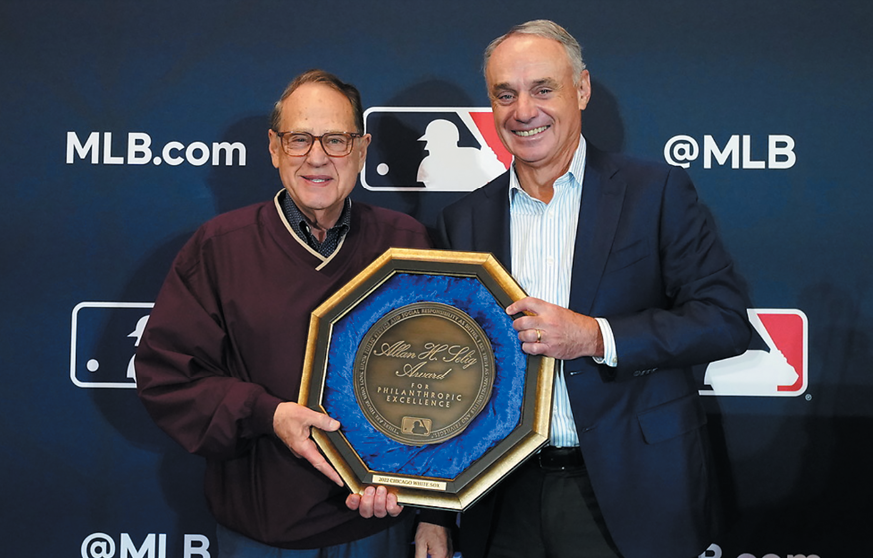
Jerry Reinsdorf receives the Selig Award in 2022
How do you decide where to focus your philanthropic efforts?
Sports is a social institution that unites communities for social good. As such, we embrace our responsibility to support our neighbors who may be in need and to direct our efforts to help make our city a better place to live, work, and play. For the White Sox, our nationally recognized ACE program (Amateur City Elite youth baseball program) has impacted hundreds of young athletes, giving them a chance to play baseball while earning college degrees. For the Bulls, two standout programs are Chicago Bulls College Prep and the James Jordan Boys & Girls Club. All of these programs change lives forever.
We strategically partner with area nonprofit and social service organizations to enhance their impact on the lives of those most in need. The charitable key pillars for the teams include raising funds to improve the lives of youth through education and health and wellness, sharing the love of the game through baseball and basketball initiatives, and championing children and families in crisis.
In addition, the teams stand ready to address emerging critical issues impacting our community, creating opportunities to lend our name and resources to help drive positive social impact. The need in our community is so great, and it is only increasing. You want to do everything. But we have learned over time that our efforts are more effective for all involved when we focus on specific areas that make sense for our brands or teams.
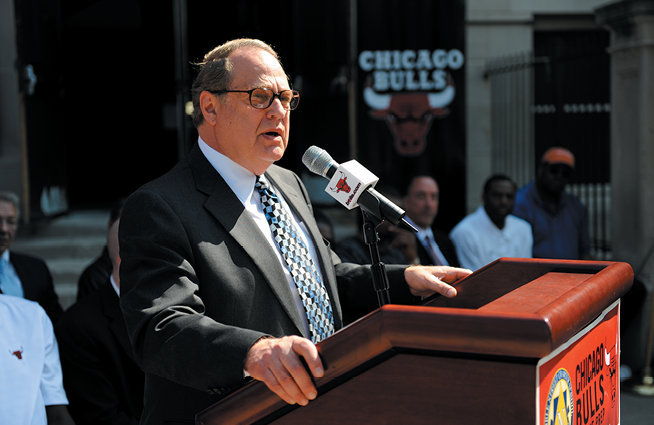
Jerry Reinsdorf speaks at a Chicago Bulls College Prep event
In your opinion, what made Michael Jordan different – not just as a player, but as a cultural icon?
There are so many aspects of Michael Jordan the player and person that align to establish him as a worldwide cultural icon. You start with his amazing athleticism and beauty of movement, his speed, power, explosiveness, and grace. Then you combine his varied and Hall-of-Fame caliber skill as a basketball player, his ability to drive to the basket and hang in the air, his shooting, his defensive intensity. Finally, you cannot talk about Michael without talking about his intelligence and his unmatched work ethic. All these attributes are at an elite level of excellence, of greatness, that only a few human beings can approach. However, I would argue that the final ingredient that made Michael extra special was his unmatched will to win. Michael brought a competitive fire – whether at practice, in games, even on the golf course – that impacted and elevated everyone around him. His drive literally made everyone else better. All of this combined to make Michael the success he is. And I think the public, fans, media, consumers, recognize this excellence, this charisma, and want to be a part of it by being fans of Michael, of his brand, and of the Bulls.
How do you approach your management style?
I see my role as setting the vision for our organization, hiring good people, and trusting them to make correct decisions. An owner of sports teams, by nature, attracts criticism. Some criticize that I am too loyal, too slow to make major changes. However, I see it as trusting my people and giving them the time and space to reach our shared visions for success. So, I may be criticized for being too loyal at times, but if that is the worst complaint people have, I have enjoyed a pretty good career.
With all the success that you have achieved in your career, are you able to enjoy the process and take moments to celebrate the wins?
I imagine that no one enjoys it as much as they should as you move through the day-to-day of life. With all the amazing highs I’ve experienced in my career – the World Series titles, NBA Championships, parades and all the accompanying accolades – I have also experienced very humbling losing streaks and defeats. So while as a competitor you don’t like to lose, I do enjoy the daily battle to improve, to get better. In the sports industry, we receive feedback after every game in the sense of a win or a loss. To be in professional sports, you have to enjoy the competition, the battle. To lean on wise words from President Teddy Roosevelt, you have to enjoy being the man in the arena and accept the outcomes win or lose. And whether we win or lose, there is always the option of a good cigar at the end of the night.
What advice do you offer to young people beginning their careers?
Listen to your mother and become a lawyer, doctor or accountant. If those are not options – for whatever the reason – I always recommend that people just beginning their careers be patient, be willing to work hard and for long hours, and take advantage of all the opportunities life presents. As I said earlier, I did not start my professional career with a set, strategic plan. I don’t think many people do, and in an amazingly fast-changing world, I also don’t believe that is a good approach. As a young graduating law student who loved the Brooklyn Dodgers and baseball, how would I have known that one day I would own two professional sports teams?
My other piece of advice for everyone is to build relationships with those above and behind you on the ladder, with your peers and also with people who may prove to be valuable mentors in business and life. No one succeeds alone, so surround yourself with talented, smart people of integrity who can share in your success. It’s much more fun to celebrate championships together.![]()